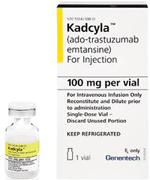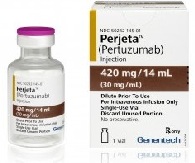
Roche ($RHHBY) has been riding high on the success of its newly augmented breast cancer franchise, charting promising numbers for standout drugs Kadcyla and Perjeta. But the company faced a stinging setback Friday. The next-gen duo failed to beat Herceptin and chemo in a late-stage study, putting a damper on Roche's plan to expand the market for its new drugs and sending its shares in a downward spiral.
Roche's Marianne study tested the two drugs against Herceptin in 1,095 previously untreated patients with advanced HER2-positive breast cancer. Kadcyla plus Perjeta, Kadcyla on its own, and Herceptin--the company's gold-standard therapy--plus chemotherapy all three helped people live longer without their disease worsening. But neither Kadcyla by itself nor the Kadcyla/Perjeta combo beat Herceptin and chemo, Roche said in a statement.
The company had hoped to show its new drugs could improve progression-free survival in untreated patients, without traditional chemotherapy, Ulrike Engels-Lange, Roche spokeswoman, told FiercePharma in an email. "While Marianne didn't achieve this, these results do not impact either the approved indications or use of Kadcyla or Perjeta in HER2-positive [advanced breast cancer]," she said. "We are proud that our medicines Perjeta and Kadcyla in their approved indications have helped people with HER2-positive [breast cancer] live longer."
The news does not bode well for Roche as it prepares for biosimilar competition to Herceptin and ramps up its cancer portfolio to take up the slack. Herceptin was Roche's third-biggest drug in the first nine months of this year, with eye-popping revenue of 4.7 billion Swiss francs ($4.8 billion). But Herceptin's first biosimilar hit the Indian market last week, and its main patent on the product expired in Europe in July. The U.S. patent runs through 2019.

Kadcyla was supposed to handle all of that. The "armed antibody" delivers Herceptin's active ingredient directly to cancer cells, a breakthrough approach that excited doctors and analysts alike. Its approval in 2013 was among the most anticipated in years, and early sales results justified that hope. Perjeta and Kadcyla have chalked up impressive numbers, with sales of 633 million francs and 371 million francs, respectively, for the first 9 months of 2014.
Perjeta has been watched closely, too, and it hit a big goal with first-line approval earlier this year. As an add-on to Herceptin, Perjeta helped patients live more than 15 months longer, according to a study presented in September, an unprecedented result in HER2-positive cancer.
But Kadcyla's time in the sun could wane in light of the troubling study data. Analysts' sales estimates for Kadcyla "will have to come down significantly," Fabian Wenner, an analyst at Kepler Cheuvreux in Zurich, said in a report, and Bernstein's Tim Anderson predicted earnings per share forecasts for the 2017-20 period would fall by around 5%.
Roche is also facing payer pushback for Kadcyla. In August, the U.K.'s cost-effectiveness watchdog, the National Institute for Health and Care Excellence (NICE) declared that the company's heralded breast cancer treatment was too expensive to cover. Roche proposed a discount to its list price, but Kadcyla costs £90,831 ($142,000) for a 14.5 month course of treatment, leaving it well above the cost-effectiveness threshold for cancer drugs, NICE CEO Andrew Dillon said at the time.
Still, there could be some light at the end of the tunnel for Roche, Anderson said in a note to investors. Kadcyla is already charting growth as a second-line breast cancer treatment, and Perjeta has that groundbreaking before-surgery approval.
"At first blush, this sounds disastrous for Roche given the importance of the HER2+ breast cancer franchise, but in reality the EPS impact is less negative than might be expected, at least by our preliminary assessment," Anderson said.
- read Roche's statement
- here's the Bloomberg story
- get more from Reuters
Special Reports: Top 15 Drug Launch Superstars - Kadcyla - Roche/Genentech | Top 10 best-selling cancer drugs of 2013 - Herceptin